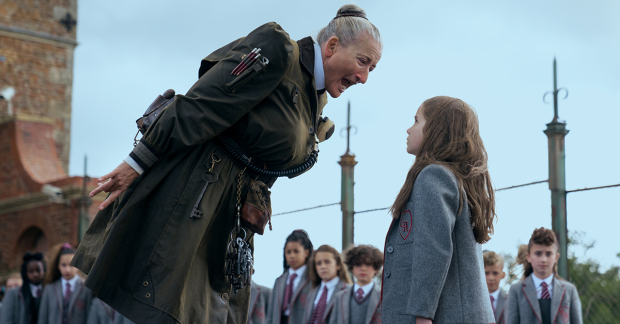Matilda on Stage and Screen – 12 Differences Between the Two

(© Dan Smith/Netflix)
Compared to some of the more radical musical movie adaptations out there (looking at you Cabaret), the creative team behind Matilda has done an excellent job modifying the show to fit the silver screen. It's worth stating – these changes don't affect the quality of the film (in fact some make wholesale sense) but they do give you good reason to go and see the show in the West End in order to compare and contrast! Some spoilers for Matilda follow!
Michael, missing
What you'll notice in this list is that a lot of the changes are to do with the Wormwood family's presence in the film. One of the big changes is the complete wholesale cut of Matilda's older brother Michael, leaving the super-powered bookworm as an only child.
A library on wheels!
In the Matilda stage show, librarian Mrs. Phelps is the denizen of a massive, technicolor library. In the film, she hits the open road, taking her library on wheels to a variety of picturesque rural locations. It definitely boosts the visual opportunities for these pivotal scenes.
Slow start at school
In the stage show, Matilda is packed off to school along with all her classmates. In the film, it's only after a school inspector and Miss Honey pay the Wormwoods a visit do they remember they're meant to start giving her an education – meaning Matilda starts school a few weeks after her friends. It's a great way to add to Matilda's obliviousness when she rocks up at Crunchem Hall.
Miracle made shorter
Due to some cuts to the Wormwoods' world (more on that later), the opening number of "Miracle," sung with panache by award-winner Matt Henry, is shorted (in fact on the cast recording it goes from ten minutes and 17 seconds down to five minutes and nine seconds). This means the loss of the Doctor's second verse, a shame as it's a banger.
Rudolfo, removed
Strictly Come Dancing's Aljaž Škorjanec had been spotted on the Matilda set during filming, presumably playing the dance impresario Rudolpho. Sadly, Rudolpho is nowhere to be seen during the film.
Bye, bye swings
It might sound iconoclastic, but the famous swings from break-out number "When I Grow Up" are completely absent in the movie. Instead, the film has a heartfelt take on the number, seeing Matilda's friends dreaming of their future careers. No swings, but still sweet!
Loud is lost
With Rudolpho gone, it's almost inevitable that his big dance number with Mrs. Wormwood, "Loud" has also been cut. It keeps the focus firmly on Matilda's time tackling Miss Trunchbull.
Pathetic pushed out
Lashana Lynch puts in an amazing turn as Miss Honey, but she has one fewer number than the stage show – in the film, her first number "Pathetic" is lost (though you'll hear it played in the show's score if you listen closely), when she goes to visit Miss Trunchbull.
Turn that "Telly" off!
With Michael gone, another lost number is the crowd-pleaser "Telly," which usually opens Act 2. The Wormwood parents don't get much by way of singing, it has to be said.
Trunchbull is a tough nut to crack
In the stage show, Matilda spooks Miss Trunchbull with a magic whiteboard conjuring up words from the long dead. In the film, things go CGI-heavy with Matilda actually building a giant ghost out of chains to scare her tyrannical headteacher. It's a cinematic choice that allows the production team to use techniques that would not be available on stage!
Mafia mania
In the stage show, there's a whole scene where Matilda saves her family's bacon by chatting to some gangsters in Russian. That climax to the show is omitted in the stage show, as is any reference to Russia.
Small little tinkering
There are some other small little changes – the film omits a reference to a "dwarf called Zeek" from this surreal moment in the perfectly executed number "The Smell of Rebellion," while Lavender doesn't get her endearing moment with her newt that normally comes early in Act 2 (though the newt still gets its starring moment later on).












